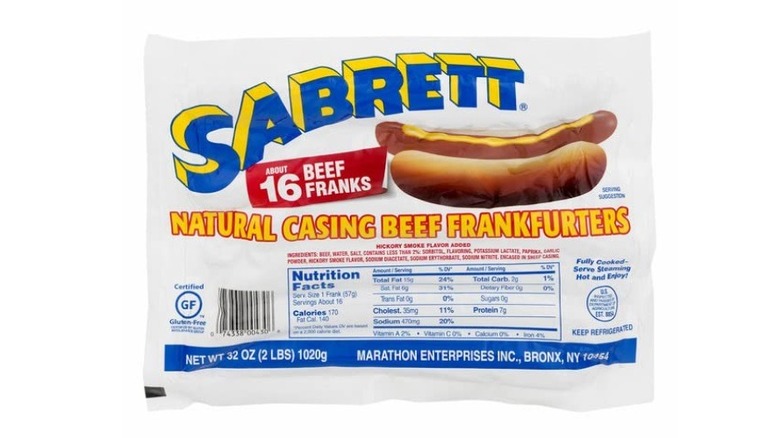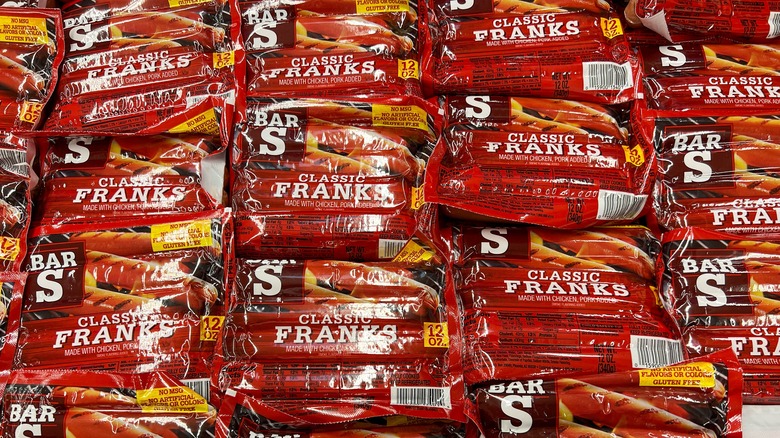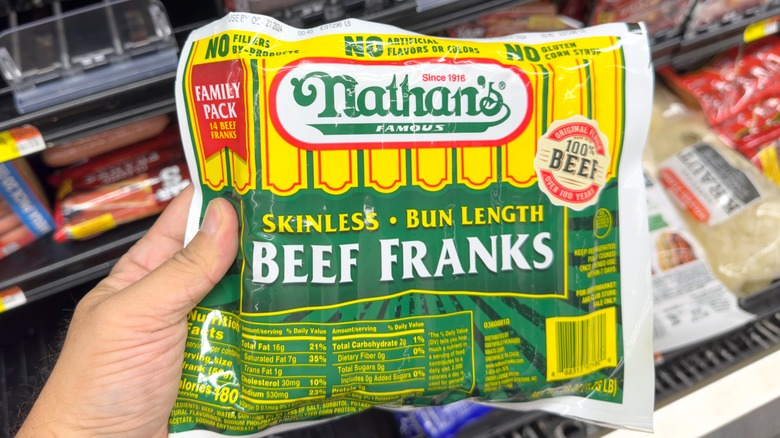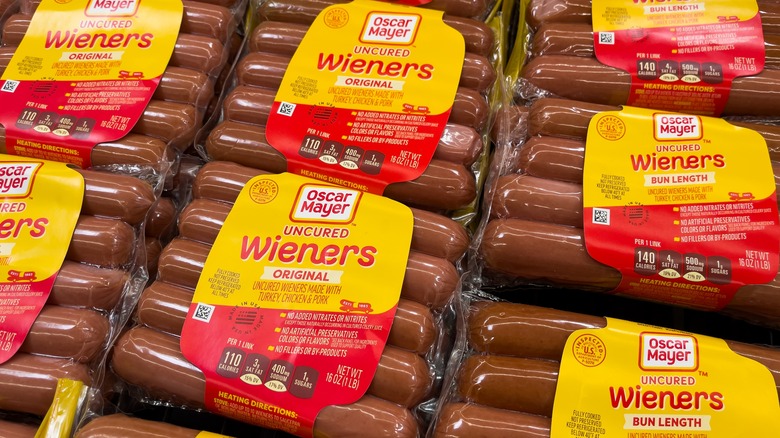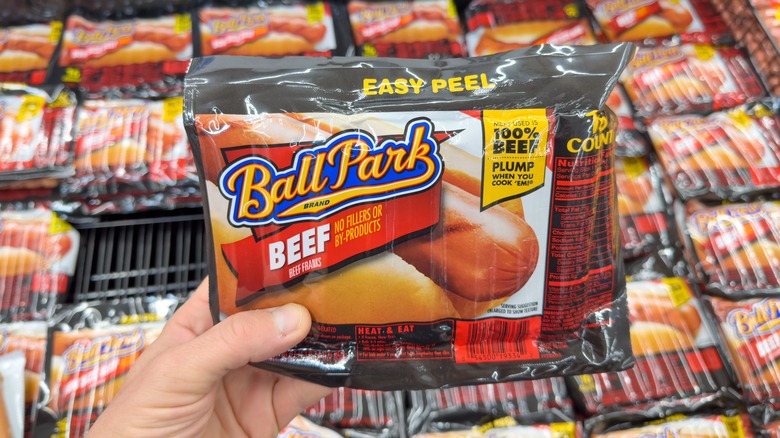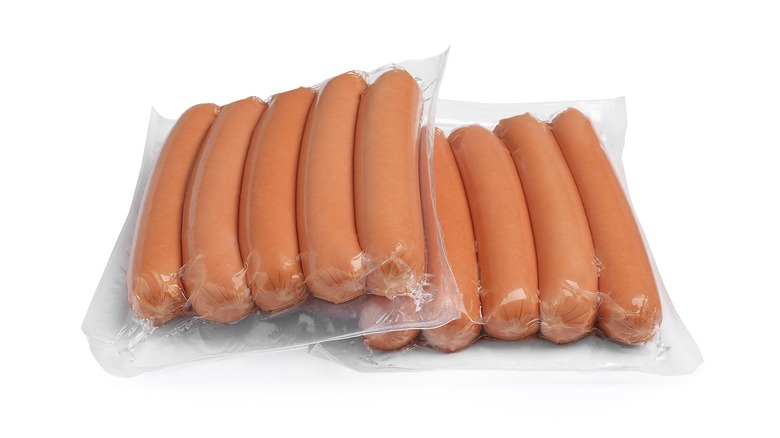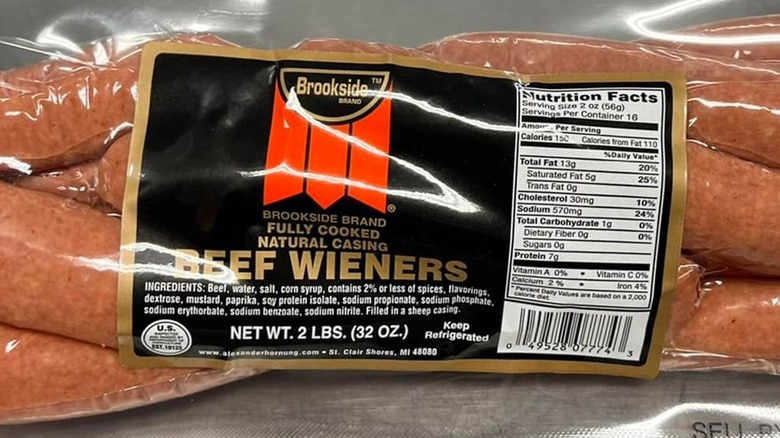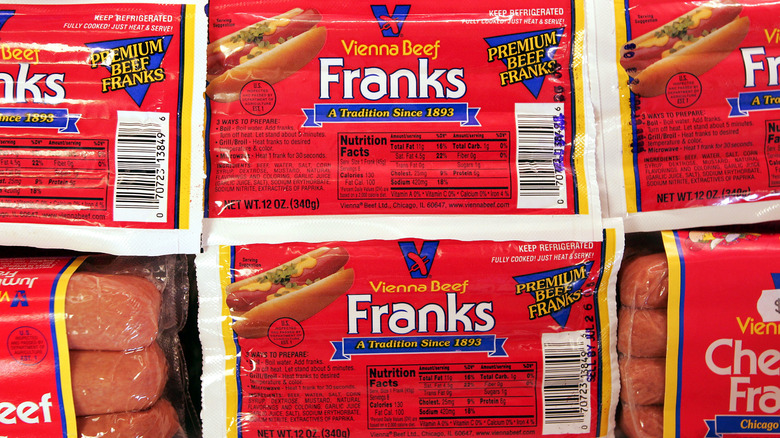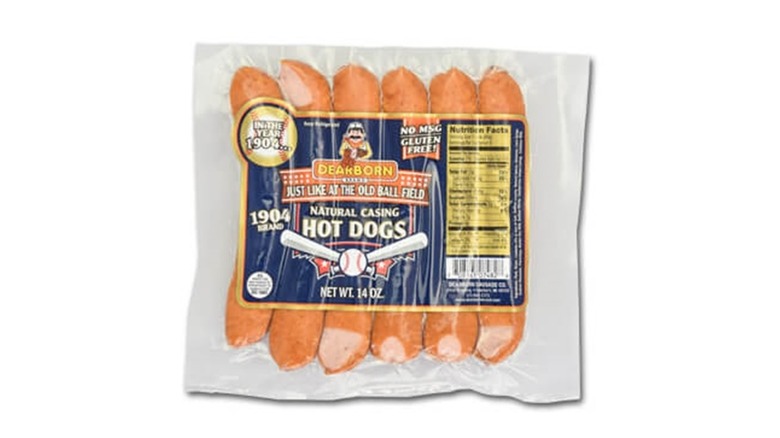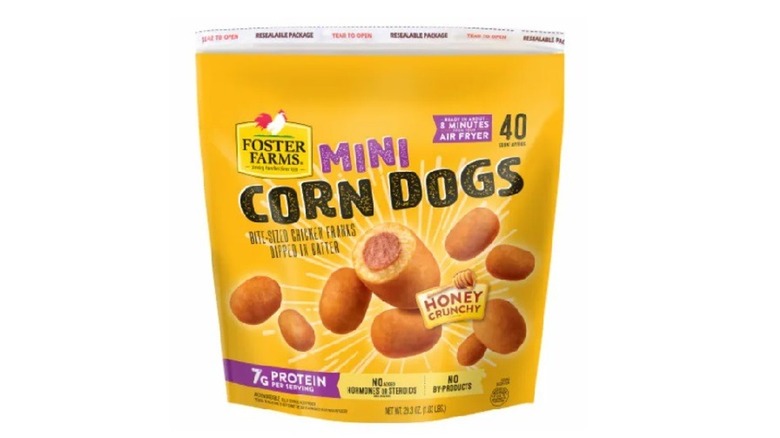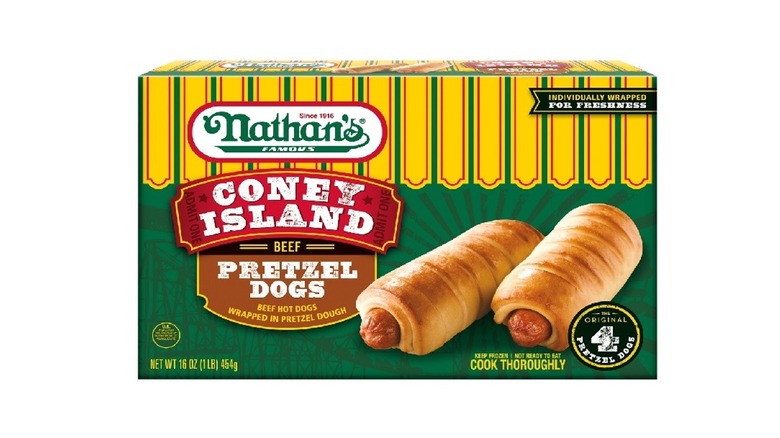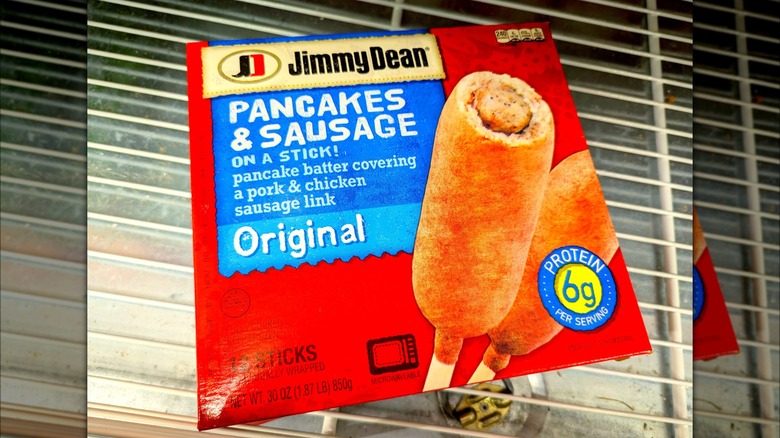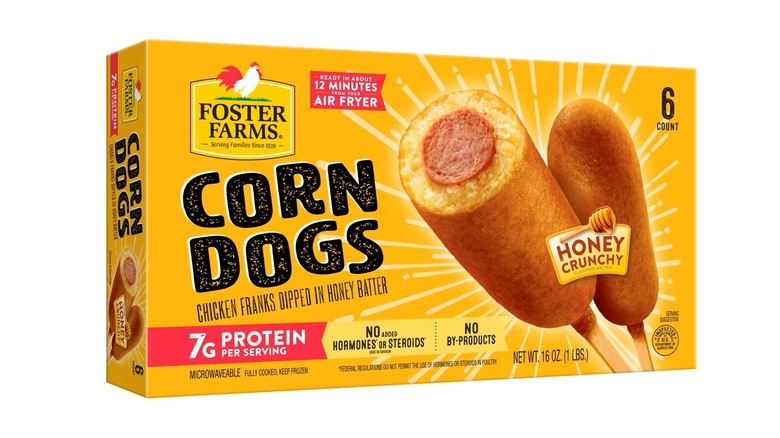The Biggest Hot Dog Recalls In US History
With all the urban legends bouncing around about what hot dogs are really made out of, it's not surprising that this ballpark beauty has been the subject of numerous recalls over the years. It may not be for the main ingredients or the standard formulas used by producers, but the hot dog sector has seen its share of safety concerns and consumer call-backs through the years. It just so happens that there have been some massive hot dog recalls over the years, all in the name of keeping consumers safe.
So what situations would be questionable enough to cause hot dog haulers to call back their product in enormous quantities? We're talking tons of hot dogs sent away, scooped up by the dog catcher and tossed into the pound for offenses like bone fragments and listeria contamination — major no-nos in the world of food safety. Going one step beyond recommending consumers avoid certain hot dogs, these recalls were put out to ensure shoppers wouldn't accidentally find questionable hot dogs in their shopping carts, refrigerators, or backyard grills. When it comes to preventing exposure to tainted franks, these are some of the big dogs of the U.S. hot dog recall hall of fame.
Kent Quality Foods recalled 140 tons of hot dogs and sausages
Sometimes the biggest hot dog recalls in the world of prepared meat are notable enough to make news across the pond. When Kent recalled a mind-blowing 140 tons of hot dogs and sausages, it made waves all the way over in the European market. The offending element in this mega-sized recall of beef-based Polish sausage was hydrolyzed soy protein, a food-safe ingredient used as a filler in many meat-based foods. In this instance, it was part of the spice blend included in the sausages, but the label neglected to call it out. Since soy is an allergen that can cause serious issues for people with sensitivities, the safest path for Kent was, of course, to withdraw the product from store shelves — even if the quantity was colossal.
To be extra-safe, any items where cross-contamination with the soy ingredients may have occurred were included in the recall, which was the driving factor behind the enormous volume of hot dogs involved. The issue was discovered in May 2018 and impacted products with label dates between September 9, 2017, and April 29, 2018, which means there were more than seven months of shipping that needed to be undone.
Wilson recalled 114 tons of its undercooked hot dogs
One of the key features of hot dogs is that they arrive in the grocery store already cooked, which means they're food-safe for a heat-up without making a big to-do in your kitchen. But when Oklahoma City-based producer Wilson Food Corp. let the dogs out before they were fully cooked in July 1994, a recall was the only way to make sure consumers didn't eat undercooked franks. So the company sent up the signal that a whopping 114 tons of Wilson's Hot Dogs and Corn King's Jumbo Franks manufactured in its Arkansas plant should be pulled back due to not being fully cooked prior to packaging. Though not all of the product involved was deemed inedible, there was no taking chances, and a full day's production was earmarked for the recall.
It wasn't the first time Wilson was involved in a large food recall because of undercooking. In 1993, the company recalled 20 tons of hot dogs for the same reason. Though two major recalls within two years meant masses of wasted product, these unfinished franks were better off being destroyed than potentially making consumers sick. Later in 1994, Wilson enacted a similar recall on its undercooked ham products. Hopefully, the company's ovens are fully functional now.
Sabrett recalled 7 million pounds of contaminated hot dogs
Try to picture what 7 million pounds of hot dogs might look like — that's how much unsatisfactory product Sabrett had to recall when customers reported finding pieces of bone and cartilage in their purchased franks. Though there are certain facts you don't want to know about hot dogs that frank fans assume when they bite into their favorite food, there can always be a more unpleasant occurrence that crops up to make the list longer. Biting into bone fragments surely tops the list.
The offending dogs were cranked out at Marathon Enterprises Inc.'s Bronx meat processing facility and distributed around the U.S. Sabrett may not be one of the more familiar names to frank fans, but the brand's presence in street corner carts bearing the famous blue-and-yellow umbrellas means consumers have easy access on a daily basis. It was no single incident that caused the contamination; hot dogs produced between March 17 and July 4, 2017, were all subject to the drawback.
Bar-S recalled 372,684 pounds of its packaged franks
Bar-S is one of the power players in the hot dog pack, which means if something goes awry with an order, there's likely a lot of scrambling to be done to get the product back. One such incident in 2016 necessitated a recall of 372,684 pounds of packaged hot dogs due to the potential presence of listeria in the chicken and pork franks. This recall also included corn dogs, a sometimes-forgotten cousin of the hot dog that may have gotten lost in the freezer and overlooked by consumers when clearing out the contaminated goods.
The Bar-S incident involved five different packages of hot dog and corn dog products produced over a four-day period in July 2016. Though no illness was reported as a result of customer consumption, the plant where the hot dogs were processed was the site of listeria exposure. Bar-S opted to voluntarily recall the items before trouble ensued to protect its customer base and keep its reputation intact.
Nathan's recalled 210,606 pounds of its famous competition-level hot dogs
Not even power eaters Joey Chestnut or Takeru Kobayashi can claim to have consumed over 210,606 pounds of Nathan's hot dogs, no matter how successful their contest careers have been. But that's how much volume the beloved hot dog factory had to round up after consumers reported finding metal fragments mixed in with their frankfurters – not exactly the texture or content you expect when you're slathering on the relish and ketchup.
Three complaints of metal found in the packages launched the recall, driving one of the best-known producers of fine beef franks to take back the hot dogs in question, all produced on January 26, 2017. As luck (or a lack thereof) would have it, the recall was announced on May 22, 2017, which happened to be Memorial Day. Shoppers were warned to check their packages before launching their cookouts to see if the codes and dates on their dogs matched up with the items in question. There were no reports of injury or ingestion of the metal pieces, allowing Nathan's to get its dogs back on the leash before any damage was done.
Oscar Mayer recalled 96,000 pounds of its much-loved franks
Maybe you used to wish you were an Oscar Mayer wiener, right down to singing the catchy jingle — heck, maybe you still do. It's not the worst dream, wanting to be loved by everyone. But you might change your tune when you find out 96,000 pounds of the classic hot dogs were recalled in April 2014 due to a potential lack of adoration from consumers, who may not have gotten the hot dogs they thought they were buying.
Thanks to an unfortunate packaging error, the company's cheese dogs were wrapped in plastic bearing labels for the classic dogs. With no call-out on the label for the milk content, customers with allergies and intolerances were at risk of being duped by these mislabeled franks. There's no swerving to miss this kind of error no matter how you cook your hot dogs. So, Oscar Mayer fired up the Wienermobile (not really, but wouldn't that have been cool?) and collected the mispackaged dogs. The issue was noticed by a sharp-eyed customer who alerted Kraft, Oscar Mayer's parent company. Unfortunately, the packages had been distributed around the U.S., making the recall quite an undertaking.
Sara Lee recalled 15 million pounds of contaminated Ball Park hot dogs
When the Sara Lee company recalled somewhere in the neighborhood of 15 million pounds of its frankfurters and other contaminated meats in December 1998, at a cost of $76 million, it was for a critical reason: listeria contamination, which led to the deaths of 15 consumers, sickened more than 80 others, and caused six women to miscarry. That recall resulted in a federal criminal charge for Sara Lee, to which the plant pleaded guilty three years later. Penalties included a $3 million donation to U.S. food safety research.
Though not as weighty as many other hot dog recalls, another Sara Lee hot dog recall pulled back 34,500 pounds of its Ball Park franks in March 2000, also for potential listeria contamination. With no reported cases of illness from exposure to the bacteria, the company was able to get ahead of a potential crisis this time thanks to a military laboratory inspection performed on a package of franks received at an Army commissary.
AW Farms pulled 6,900 pounds of its hot dogs from store shelves
AW Farms, the hot dog producer, undertook a hefty recall in July 2024, during which 6,900 pounds of its packaged sausages went out the door without undergoing a required federal inspection. Though the Argillite, Kentucky, company experienced no reports of adverse effects from consumption of the hot dogs in question, the inspection hitch was problem enough to bring the product back to the fold rather than leaving it out in the world.
Distribution was restricted to Ohio and West Virginia, where the hot dogs were sent to hotels and restaurants, bypassing the general grocery consumer. Still, anyone who may have eaten the hot dogs in those locations could have encountered issues due to undetected contaminants that might have been caught during the inspection. So out of an abundance of caution, the company urged kitchens with the suspect dogs in their possession to either toss them in the bin or return them to their place of purchase.
Perdue Premium Meats recalled 3,384 pounds of mislabeled hot dogs
Imagine a company named Perdue Premium Meat having to call back over a ton of its product due to consumer safety concerns. This bit of corporate irony happened in July 2023, when the manufacturer sent out the no-good, low-down dogs containing undeclared allergens. The company's Brookside Smoked Sausages wrapped in the mislabeled packages contained milk, which was not declared on the packaging despite its allergen status. Once the error was discovered, the company put out an all-points bulletin for the 3,384 pounds of franks that didn't make the grade but entered the distribution chain regardless.
With distribution contained to Ohio, there was only a single state involved in the recall process. No reports of injury or illness were documented, which was incredibly fortunate, considering the recall coincided with Fourth of July celebrations around the state. Shoppers were warned to check their packages and toss or return any Brookside dogs that fit the digital profile of lot and product code, as well as sell-by date.
Vienna Beef performed a recall on 2,030 pounds of its premium hot dogs
Apparently metal contamination is a pretty common peril in the world of hot dog production. Just ask Vienna Beef, which recalled 2,030 pounds of its packaged franks in May 2019. A Class I recall issued by the FDA for these dogs warned of the metal content, at levels that indicate the occurrence of potentially serious health issues were the dogs to be consumed. All products in the recall were skinless beef franks, which might lead amateur food detectives to wonder if the skinning process could have led to the contamination.
Thankfully, the metal-bearing dogs were in 10-pound restaurant-sized cases sent to eateries in Illinois, Wisconsin, and Indiana, which helped the company zero in on the boxes in question and pull them back easily. There was no retail involvement, which meant shoppers weren't at risk, and no subsequent issues were reported by consumers who may have frequented the affected restaurants and come into contact with the inedible hot dogs.
Dearborn Sausage Company drew back 1,944 pounds of its hot dog creations
In September 2024, Dearborn Sausage Company was forced to recall nearly 2,000 pounds of hot dogs due to an unintentional label swap. The hot dogs, which had been shipped to Ohio, contained undeclared pork and soy elements, neither of which were presented on the packaging. Beef wieners ended up being labeled as beef and pork, while the beef and pork wieners went out the door labeled as beef only, causing confusion that customers wouldn't have even detected when shopping.
Though the recall hoped to avoid potential physical injury and illness, there were also more complex reasons for engaging the hot dog retrieval. Soy is a known allergen which is called out at the bottom of the ingredients list, making it easier for anyone with a sensitivity to sidestep the item in question. Items containing pork are unable to be considered kosher or halal, which would compromise the strictness of anyone following those disciplines — without them even knowing. To prevent distress, the USDA issued the recall and no reports of illness or injury were reported.
Foster Farms recalled 76,961 pounds of mini corn dogs due to complaints of spoilage
It may have been mini corn dogs recalled by Foster Farms during a 2023 recall, but the quantity of product involved was anything but tiny. The popular producer hauled back 76,961 pounds of its tiny breaded sausages mid-year, thanks to customer complaints of a foul odor, a wonky appearance, and a bad taste – a combination that added up to spoilage and could have resulted in illness for consumers who took the double-dog dare and ate the corn dogs anyway.
If anyone ended up getting sick from the bite-size Foster Farm nuggets, their complaints weren't registered to the USDA, which allowed both the agency and the company to head these little doggies off at the pass. With the recall limited to 1.83-pound bags containing 40 battered chicken franks, it might seem like an easy effort. But the product had been distributed throughout the U.S., which meant instructions were issued for customers to toss out any bags in their freezers or take them back to the point of purchase for a refund as stores were notified to pull stock from freezers to avoid further sales and minimize fallout from inadvertently putting consumers at risk.
City Line Foods Manufacturing Co. recalled 1,196,669 pounds of pretzel dogs due to allergen mislabeling
Apparently, mislabeling products is a relatively frequent occurrence in the frankfurter business. City Line Foods Manufacturing Co. ran into a nasty case of mix-and-match with its pretzel dogs which required a huge recall involving 1,196,669 pounds — yes, pounds – of its dough-wrapped franks in November 2014. Food additive and known allergen soy lecithin had been used as a releasing agent on production surfaces but no warning was given on the wrappers, resulting in a Herculean drawback to make sure no consumers with soy allergies were unwittingly affected. Aside from the City Line Foods branded items, the company's products were also distributed to vendors such as Auntie Anne's and packaged as Nathan's Famous Pretzel Dogs, which meant there were mislabeled pretzel dogs running around all over the place.
It's a calculated risk to issue a recall of any size, but for one as extensive as this, it begs the question: How much product actually gets returned? The USDA website notes on this particular recall that out of almost 1.2 million pounds of pretzel dogs, the quantity recovered was 281,790 pounds. And that answer raises another question: What happened to the other 900,000 or so pounds? It's a mystery wrapped in a pretzel-based enigma.
Hillshire Brands recalled 58 million pounds of corn dogs and sausages on a stick
It's hard to even picture what 58 million pounds of corn dogs and pancake-wrapped breakfast sausages on sticks looks like, let alone to imagine how a company can move it all to stores and then pull it back again. But that's exactly what Hillshire Brands did in September 2025 after a recall was issued due to the possibility of wood pieces being found stuck in the batter. The Food Safety and Inspection Service issued the recall for items sold between mid-March and late-September 2025, during which products under the company's Jimmy Dean, State Fair, and Fresh to You labels were sold. Customers logged complaints about encountering the stray bits; five reported injuries sustained after eating the corn dogs in question, prompting the recall.
How does such a slip-up happen? An internal investigation conducted by Hillshire revealed that the sticks for the products in question had been inserted prior to battering, resulting in splinters becoming embedded. And though the products included both commercially-sold corn dogs and food service items distributed to schools and the U.S. Department of Defense, it was determined that only the commercial products qualified for the pull-back. To err on the side of caution, FSIS recommended disposal of all stored products regardless of location. That's a lot of corn dogs hitting the dumpster, in what also became one of Costco's biggest recalls of 2025.
Foster Farms recalled nearly 4 million pounds of chicken and turkey corn dogs
In October 2025, poultry producer Foster Farms sent out a massive recall notice that impacted chicken- and turkey-based corn dogs that had been sold between July 30, 2024 and August 4, 2025. Batter-wrapped chicken franks and pancake-wrapped sausages were included in the notification, all potentially tainted by bits of wood that had broken off the sticks. A complaint logged by a customer who'd eaten one of the products in question kicked off the Class I recall, a level that indicates potential health issues or even death could result from consuming the tainted items.
This recall followed closely behind the Hillshire incident, though the FSIS didn't draw a connection between that and the Foster Farms recall. But the FSIS recall notice made reference to a similar-sized pool of customer complaints and five consumer injuries reported, as well as a description of the locations to which the questionable product had been distributed. Also like Hillshire, Foster Farms called for both customers and commercial food service locations to dispose of all 16 item types with the relevant distribution codes.



